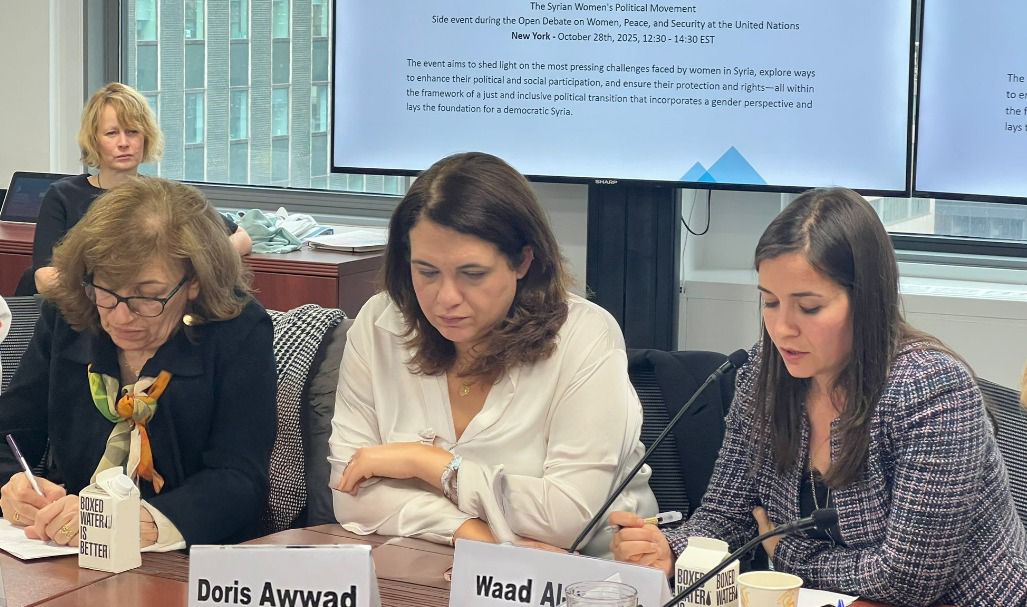New York, Tuesday, October 28, 2025
Waad Al-Kateab’s Speech During the Event “Our Path Toward Equality, Justice, and Democracy”
- updated: November 4, 2025
Thank you, Madam Moderator,
and thank you to the Syrian Women’s Political Movement for bringing us together today.
I want to continue from where my colleagues have spoken — about the deep and ongoing challenges facing women in Syria: the violence, the exclusion, and the struggle to live with dignity in impossible circumstances.
All of this is real, and painful.
But today, I want to focus on something else:
on the extraordinary courage of women who are still creating life and meaning in the midst of destruction.
Women who are not waiting for peace to be declared — they are building it every single day, with their hands, their voices, and their hearts.
Despite fear, loss, and exhaustion, women across Syria continue to find ways to gather, to speak, and to lead.
And I want to show you three small pictures that capture that courage.
The first picture I want to place in your hands comes from my small hometown, Masyaf.
Imagine an old cultural hall — the curtains faded, the chairs covered in dust, the electricity flickering on and off.
Yet that night, the room was full — men and women, young and old.
The event was open to everyone, but it was organized entirely by the Women of Masyaf Collective — a group of women who, for years, have worked in different ways to revive their town and nurture a living community spirit.
That screening was just one of many initiatives they’ve led — small acts that bring people together through art, culture, and conversation, despite every obstacle.
That night, they cleaned the hall with their own hands, borrowed a projector, and screened For Sama.
For the first time in a long while, people sat together and saw their own story reflected on the screen.
There were tears, silence, laughter — and long conversations about return, belonging, and how to rebuild hope again.
It wasn’t just a film.
It was a moment of life created by women, shared by everyone.
The second picture is of one woman from Aleppo.
A woman who managed to bring together 150 women from the city and the countryside in one hall to talk about the upcoming People’s Assembly elections.
It was an astonishing scene — many voices speaking freely, faces from distant towns and neighborhoods, women coming to learn, to question, to understand.
There was no political party, no funding, no permission — only the conviction of one woman who believed that knowledge is the first step toward change.
But behind this large picture lies a long journey.
Before that day, this same woman had travelled from town to town, holding small meetings in homes or community centers — sometimes with six women, sometimes ten or twenty.
They sat in small circles, discussing basic but vital issues like the constitutional declaration, citizenship, and what it means for women to take part in decision-making.
From those small gatherings grew this larger moment.
From years of patience, travel, and dialogue, the dream became real.
And in that hall in Aleppo, as 150 women came together, a real moment of awareness and democracy was born — built by women, with their own hands.
The third picture comes from Damascus, Idlib, Sweida, and other Syrian cities, where we see families of the detained and the disappeared.
So many women — mothers, wives, daughters — each carrying her pain in her own way, yet all united by the same determination to know the truth.
In the streets, outside public buildings or in small squares, they stand holding photos of their loved ones, hand-written signs asking: Where are they?
Their faces are tired, their eyes full of sadness — yet filled with dignity that cannot be broken.
Each of them knows that standing there is dangerous. And yet, they stand.
These women are not only fighting for their sons or husbands.
They are defending the memory of a broken country, trying to gather its shattered conscience in their own hands.
They speak out against silence, against forgetting, against erasure.
They are not waiting for justice to be granted — they are creating it themselves, step by step, with courage, words, and truth.
These three pictures — the light of the screen in Masyaf, the voices of the women in Aleppo, and the banners in Damascus, Idlib, and Sweida — are not just moments.
They are messages.
Women in Syria are not waiting for anyone to give them space — they are already building it.
But the responsibility to protect and empower them does not fall on them alone.
My message here is first to the current Syrian authorities:
Protecting women and supporting their participation is not an act of generosity — it is a national and moral duty.
There can be no future for Syria without a genuine belief in women’s roles.
Women’s participation cannot remain a slogan — it must become real action, policy, and presence.
And let’s be honest:
the old patterns that continue — the marginalization of women, the restrictions on their public role, the abductions, the systemic violence,
the attacks on their “honor” instead of engaging with their ideas — all of this threatens the fragile spaces women have fought so hard to create.
If this fear and repression continue, then those three images I spoke about — from Masyaf, Aleppo, Damascus, Idlib, and Sweida — may fade away.
The light women have kept burning in the darkness of this wounded country could be extinguished.
That is why we all — men and women, inside and outside Syria — must strengthen, protect, and stand beside these women.
We must be their bridge, their allies, their echo.
Because keeping these spaces alive means keeping hope itself alive —
for all of Syria.
